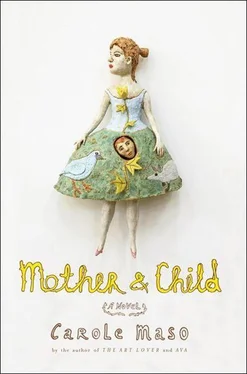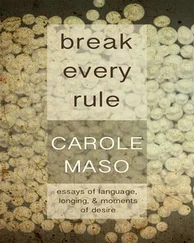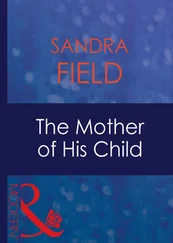The child saw only that her mother was tying the laces of the most wonderful sneakers in the world, and that they lit up and had princesses on them, and that her mother was beautiful.
THE DEAD BIRDS, still warm, have been arranged from warm to warmest on the path by Bunny Boy. The mother is getting fed up. Isn’t there a primeval forest, isn’t there a deep unconscious better suited for this sort of thing? Why this path, the path she must walk day in and day out, to the mailbox, to the car, to the world at large, littered with the newly dead, still warm? Along with the birds, the path has become more and more crowded with the things she dreads; but it is okay, she tells herself, it is just something else to bear.
On the path now, a jar. On the path a glove, a stethoscope, a briefcase, a silver basin, a pair of gleaming scissors, a doll’s head, a torch.
There is a wilderness deep inside her, a place she now no longer allows herself to go. It might frighten the child and the child might then disappear. More than anything, she knows she must stay close to the path.
If the wilderness wants to come, it must meet her more than halfway; it must come to this path now, from which she will not veer.
EACH DAY NOW, the schoolgirls appear on the path with backpacks and sharpened pencils. All they want is to resume their studies. All they want is to go to school again. The mother motions to them to come, and she hands them a book and tells them to take a seat.
THAT NIGHT THE mother sees in the distance a flame and she tries to walk to it, but no matter how far she goes, she never arrives. The mother becomes tired and decides to sit in the meadow and watch the flame from afar, as it is her job, she knows, to keep track of the paths of fire whenever possible.
IN THE ANCIENT world, a torch has been lit on a mountaintop, and soon it will be traveling across the world to the Olympic Games, and the announcement is made that the entire sojourn will be projected on a screen at the Spiegelpalais.
The Mother Flame, origin of fire, shall accompany the Torch on all its travels. The Mother Flame cannot be extinguished. She is stored in an official lantern and is always there. Yes, the mother thinks, she is just like any mother.
Keeping the Torch lit will be the responsibility of ten flame attendants who attend to the fire twenty-four hours a day. The mother and child will sit in the front row of the great theater transfixed. The Torch will ride on a camel and on the Concorde and in a North American canoe. The child will keep close track of its itinerary. The newspaper fears for the Torch and its mother because GinGin, the place that is the Torch’s destination, is controversial on more fronts than one.
THE MOTHER AND child bring their trundle beds to the Spiegelpalais as they do not want to miss even a second of the flame’s transit. Most times it is only the mother and the child who are there holding vigil, and they wonder where everyone else is. A place of fire is being prepared for them, the mother surmises — what other explanation could there be?

THE FLAME SITS in its specially designed charter plane, glimmering in the corner. Security is high. The mother and child eat popcorn and stare at the enormous screen, riveted. The Torch and its group of round-the-clock guardians often take up residence in the most chic hotels. They all go to the hotel bar. The bar patrons sense something glowing in their midst, but they know not what.
At night the Torch sleeps in a lantern along with its mother, who sleeps beside it. It stays in a single room each night with three watchmen, one of whom must be awake at all times. At night there are the wonders of the world and constellations, falling stars, and from their trundle bed they observe the heavens through the Spiegelpalais’ skylight.
At Gethsemane, despite the assurances that they would stay awake with Jesus in his darkest hour of need, the apostles fell asleep. When it comes to the Torch, a world of sleeping potions and conspiracies and dastardly acts orchestrated from somewhere else does not sound so far-fetched.

THE FLAME COMMEMORATES the theft of fire from Zeus by Prometheus. Look, the mother cries, it’s Paris! If there is a place in the world the mother would like to see before she dies, it is Paris. In Paris, black banners are hung on Notre Dame and the Tour Eiffel to greet the Torch. French protesters attempt to steal the flame, and the flame is extinguished five times. But you cannot kill fire, try as you might. The resurrected flame cowers, and eventually the Torch is driven by bus to the stadium.

WHEN THE FLAME arrives in the City of Saint Francis, accompanied by dignitaries and protected by riot-ready security, a round of photos is taken and then the flame retires.

THE VORTEX MAN appears from inside the whirling world. Hold on to your hats! he cackles. The Torch, fed by the Vortex, blows furiously in its cup.

THE CHILD IS mesmerized. Protesters announce their desire to kidnap the Torch, to take the flame hostage — every mother’s nightmare. The Mother Flame fears that if the Torch is captured by protesters, there is always the possibility that the Sympathy Syndrome will set in, and if this occurs, she may never see her little flame again.
It is called the Sympathy Syndrome when a captive begins to sympathize with its captors and begins to do uncharacteristic things of all sorts because of its deep affection for its newly bonded attendant.
The child wonders if the flame is captured and begins to sympathize with its captors, and if it heads up the liberation of TingTing, GinGin’s enemy, and breaks from its box, whether the earth will be consumed in fire. The child thinks she should number her worries, but before long, the child is asleep and the mother is left to track the flame.
The next day, the mother, whose tears are flammable, looks at her dry-eyed and tells her it is not for her to worry about.

THE CHILD IS packing her backpack for the day. It is too heavy, the mother says, and she takes out all the items — the pencil box, the calculator, the complete works of Lewis Carroll, the Piglet, the wooden rosary, the lip balm, the photograph of the Eiffel Tower — and she rearranges everything and puts it back. The child finds that just because of her mother’s touch, the objects have lightened, and smiling and weightless and worry-free, she rises up, and heads off to school.

THE TORCH WOULD like to climb Mt. Everest and cares nothing for Doomsday Predictions or the Sympathy Syndrome. In its mind, if a flame can be said to have a mind, the flame is free.
The mother, for one, thinks all fire should be treated with respect.
Through the skylight of the Spiegelpalais, the child sees three silent astronauts from GinGin making gestures. They’re tethered only tenuously, it seems, to GinGin anymore. They are looking for Torch, they say.

WHEN THE TORCH appears again, it is in India, and the mother imagines it might mingle with the fires of India, a country that in her mind is always burning. She imagines the Ganges sometimes when she and the child go to their own river, and all the small pyres.
Читать дальше













